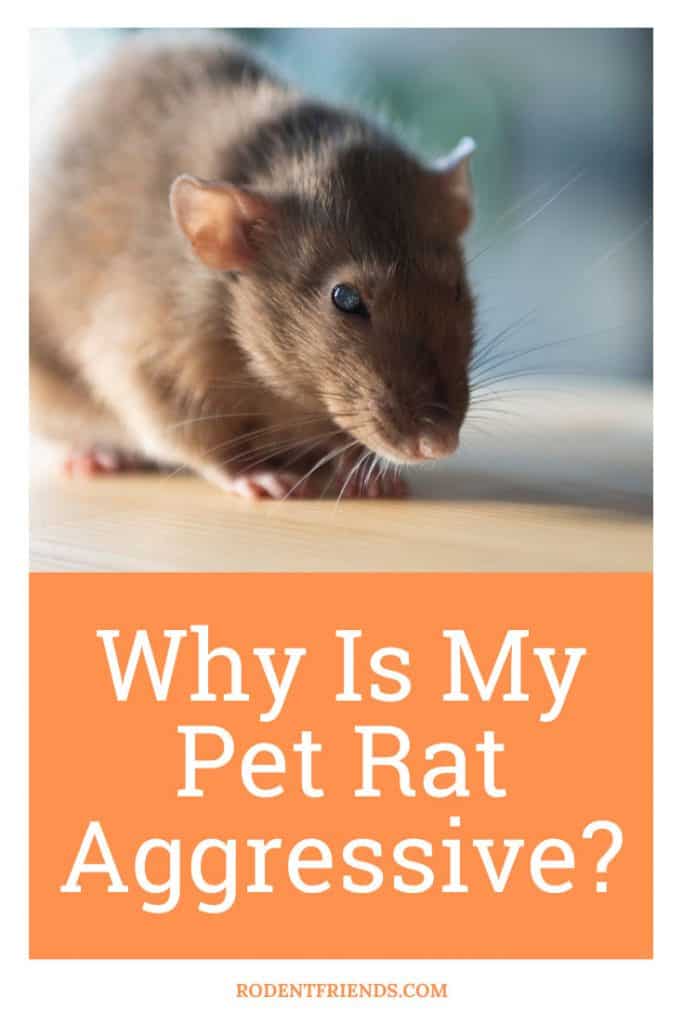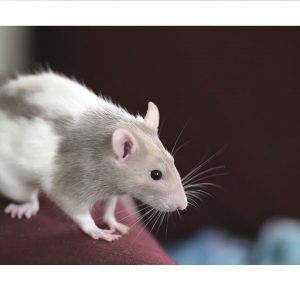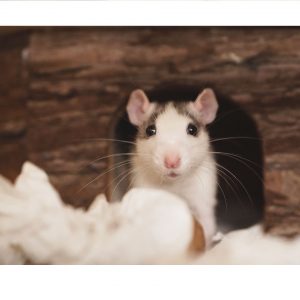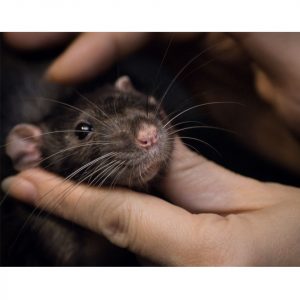Is your pet rat biting you? Is your rat showing aggression? Are you afraid of how to handle the aggressive rat or how to stop them from being aggressive?
Well, if the answers are yes then no need to worry because in this article we’ll tell you the causes and signs of aggression in rats and how you can stop your pet rat from being aggressive.
Pet rats are usually aggressive because they are in a state of fear. They need time to adjust, as well as patience and understanding from the owner.
It is important to keep yourself from rat aggression and learn about the necessary measures you would want to take in such circumstances. And that’s exactly what we’ll be going through!
Signs of Aggression in Rats
As a pet rat owner, you may notice some considerable changes when the rat is happy or angry. The behavioral shift in rats is the biggest indicator that manifests how they are feeling at that moment.
It’s important to understand your pet rat’s movements and moods, so you know how to react and adapt to the situation:
Fleeing and Hiding
It depends on the situation of your pet rat. Sometimes rats like to hide behind the doors or curtains during their playtime. However, if you notice this, mixed with other weird or uncommon behavior, it is clear that your rat is frustrated.
Hissing and Exposing Teeth
Rats, too, like other animals, indicate aggression by showing teeth to the second person. It’s a way for them to intimidate you and warn you.
If this happens while your pet rat is trying to hide, then it can be a clear sign that the rat is not in a happy mood at the moment.
Posturing
As a response to fear, most animals will try to appear bigger. Pet rats will puff themselves up so they look bigger than their normal size to scare away the owner, the person playing with them, or is present around them in this scenario.
Lunging
The rats know how to lunge to push their owners away when they do not want to play. They will either attempt to attack you from inside of their cage or might bite you in the hands when they are a bit angry and want to show aggression.
Most of the time, these bites will just be a warning, and no blood will be drawn. However, if you insist on interacting with them, they might get rougher.
Fighting With Other Rats
A ferocious behavior from your pet rat might indicate that it wants to showcase its dominance over other rats. Pet rats tend to play fight among them and even show dominance through this activity.
There are other reasons why your pet rats are fighting, and I cover those in this article right here.
However, if the other pet rats start showing injuries and missing fur from their bodies, then it means they are being hurt by another, particularly aggressive pet rat.
Aggressive Biting
This factor, like the first one, depends on the circumstances too. In some cases, your pet rat will give you a little nibble thinking you are holding a treat for it.
Even during playtime, rats are more likely to accidentally give you scratches and small bruises as they have sharp teeth and nails.
However, in other cases, if you notice a sudden rush of blood and a deep wound on your arm, face, or hands, then it is obvious that this is because your rat is not playing.
This situation is not normal because rats do not deeply bite their owners generally. This only happens when the owner is doing something that is offensive to the rat.
Causes of Aggression In Rats
Rats are always enthusiastic pets, but there can be some scenarios that can trigger their aggression in a few seconds.
For this reason, it is beneficial to keep them at bay from such situations that cause them to show anger at you.
You are now well-familiar with the symptoms of aggression when you are a pet rat owner. Symptoms can prove to be a great way to understand what factors contribute to the manifestation of aggression from your rat’s end.

In this section, you’ll be able to understand some of the causes of rat aggression. Along with the symptoms, it is necessary that you learn about the causes as well. This will immensely help you in your journey as a pet rat owner:
Provocation
Pet rats are prey animals, for that reason, they are very fearful animals. They do not like to be bothered or tortured on purpose.
Even though their first response tends to be to flee the situation, the opposite might also occur. Your pet rat might instead turn aggressive and that makes them more inclined toward attacking.
Here are some things to avoid doing to your pet rat: pricking, poking, pulling its soft fur, and holding it too tightly.
If you have children at home, it’s important to teach them how to handle a pet rat. Children can sometimes be a bit more forceful than they wish to and a pet rat might see that as a form of aggression and get scared.
In some situations, when a pet rat gets sick or is in pain, it’ll avoid contact with you. They’ll hide their condition.
It’s possible for them to show aggression when being handled, for that will show their weakness. If this is the case, consulting a vet immediately is the best practice.
Maternal aggression
Some mother rats begin to over-protect their newborns. This can be quite a common behavior, especially if it’s a particularly nervous rat.
If you are noticing this kind of behavior from your rat, then it is essential that you lure her with treats and take care of her babies to showcase that you are not the enemy; instead, you are a friend and she can trust you.
On the other hand, if this kind of behavior persists, it’s important to contact your vet to better understand what’s happening and what to do!
Stress
Your pet rat can be distressed too. One of the key factors that will help you make sure of this is the secretion of special substances from its eyes and nose during stress.
In fact, there are studies showing that “high aggression in rats is associated with elevated stress”.
Some rats will screech and make pestering noises signaling you that they are under a lot of stress or not feeling well.
If you do notice this, it’s important to take your pet rat to the vet, so you can discern what’s wrong with them.
There are also other reasons that pet rats squeak, that you can read about here!
Trauma and abuse
If you adopted a rescue pet rat, they can sometimes come with some past traumas. It’s important to ask some questions and inform yourself about the rat you’re adopting.
This way you know if they are scared of something in particular or what you should avoid so they’re not in distress.
Knowing your pet rat’s past as well as knowing what triggers them, makes it an easier adaptation for both of you.
Some rats are abused during scientific and biological experiments. These rats are terrified of humans and defend themselves by showing exasperation, for example.
They might take longer to get used to their owners, but with time and patience, you’ll get there!
How To Stop Aggression in Rats
We talked about different ways your pet rats can show aggression and how.
But we also have solutions for you, so to avoid this from happening:
Neutering
Male pet rats tend to start to show dominance once they reach puberty. They do this by fighting each other, as I mentioned above. If too many male pet rats live in the same cage, it’s common for them to turn more aggressive.
For that reason, it’s important to neuter your pet rats. If you do have male and female rats living in the same cage, this will avoid unwanted pregnancies.
Not only that, but a neutered pet rat will be less energetic and won’t feel the need to be dominant.
It reduces the sexual drive of rats and alleviates the stress they are suffering from simultaneously. As a consequence, your pet rat will stop being aggressive.
You might not notice the difference right away. Even though your pet rat has been neutered it takes some time for them to adjust their behavior.
But don’t worry, for soon you’ll see your pet rat changing for the better!
Free-roaming
Pet rats need entertainment. It’s important to have lots of interesting toys and accessories in their cage, so they don’t get bored.

And even then, your pet rats need to leave their cage and experience some activity out of it. This way they can keep living a healthy and happy life.
If your pet rats are too bored, they might start showing their frustration through aggression. This is actually true for most animals/pets. They need enrichment and activity.
Let your pet rats wander and explore your home twice or thrice per week. This will give your rat a chance to freely roam around your home according to its will.
You can do this by keeping an eye on the rat so that they won’t get where they shouldn’t. You can also create a safe perimeter to serve as a playground.
We do have a complete guide on free-roaming right here. This way you can create a safe place outside so your pet rats get some extra exercise!
This way, you’re sure your pet rats have a safe place to play and explore, without getting into mischief!
Feed With A Metal Spoon
If your pet rat tends to bite things off your fingers, this can be an effective part of rat training. When you use a metal spoon to feed your rat, it bites the spoon in the first place.
This is because the rat is habitual to biting. However, with the spoon, your pet rat will get the idea to not bite, but instead take the treats and food slowly and with care. This needs patience from you as the trainer and the rat owner.
Pet rats tend to be very careful when taking things out of your hands. However, a more enthusiastic or nervous pet rat might bite/nibble your fingers in the process.
The metal spoons do not break the rat’s teeth at all. Their teeth are actually powerful enough to interact with metallic objects in any circumstance.
Not only that, but after a few tries, your pet rat will understand that biting the spoon is not ideal and will change tactics.
As you start noticing your pet rat calming down, you can slowly start feeding treats from the tips of your fingers again!
Place Fabric In Cage That Smells Like You
Another great technique to cope with an angry rat is to try keeping a cloth that you often wear in its cage.
The scent on this cloth or fabric will make the rat get familiar with it. This will ultimately end up in your benefit.
Your pet rat will start interacting with you and will recognize you every time you go to their cage. This is an outstanding method to maintain a behavioral balance for your pet rat.
This method works on cats brilliantly, and there have been rat owners that had discussed their experience with this method when it came to dealing with their angry pet rats.
Letting our pets recognize and get used to our scent is very important in the bonding process, among other steps. I wrote a full guide on How To Bond With Your Pet Rat, so I recommend taking a look at that as well!
Use of Gloves
In particularly aggressive cases, it’s good to use some gloves. This way you’re protecting yourself, while also letting your pet rat get used to your interaction.
Just wear a pair of soft gloves, like those you wear in winter. You will notice and witness a shift in the attitude of your pet rat towards you.
Wearing gloves will protect your hands if the rat tries to bite you. Besides, the soft texture of gloves will help you caress the rat to let it know you are loving and petting it.
With time, your pet rat will get used to your scent and you’ll be able to remove the gloves.
One thing to have into consideration is to always wash your hands before handling your pet rat. If you handled something nocive for your pet rat, they might ingest that if they lick your hands, for example.
But your hands might also have a strong smell that your pet rats don’t like. For that reason, your rats might not feel your hands welcoming.
For example, I wear rubber gloves when cleaning our girl’s litter. Due to its smell, they do not take it lightly and will actually pinch my hands with their little teeth!
So, when handling your pet rats, be sure your hands are devoid of strong smells, so they feel more confident and safe with you.
Frequently Asked Questions
Why is your rat suddenly biting you?
It depends on the situation. If you are poking it or pestering it intentionally, then your pet rat might try and defend itself by attacking you either using nails or teeth.
In other cases, if you did not do anything and the rat is showing anger symptoms, this is the case that your rat requires immediate attention to access what is wrong with them.
What are the signs of aggression in pet rats?
Rats indicate aggression by biting, scratching, and chasing the other individual. It certainly means that they are ferocious due to something that is bothering them.
A least aggressive pet rat might also lie down on their back and follow a belly-up posture, as a sign of compliance.
Do pet rats intentionally bite you?
There are many reasons for a pet rat to bite you, but you can read more about why are pet rats biting you right here!
Pet rats very rarely bite you in a form of an attack. As we’ve seen throughout this article, they’ll only do so under specific situations. If it does happen, then there’s something wrong going on and you need to access it.
It usually helps to ask for help from a vet, so you can better deal with the situation.
However, most of the time, your pet rat might accidentally nibble you when taking treats from your hands.
They might also give you a warning bite if they don’t enjoy the way they’re being handled. But these warning bites are usually very soft and won’t draw any blood. They’re just communicating with you and asking you to stop.
Read here on how you can bond with your pet rat faster and how long it usually takes!






